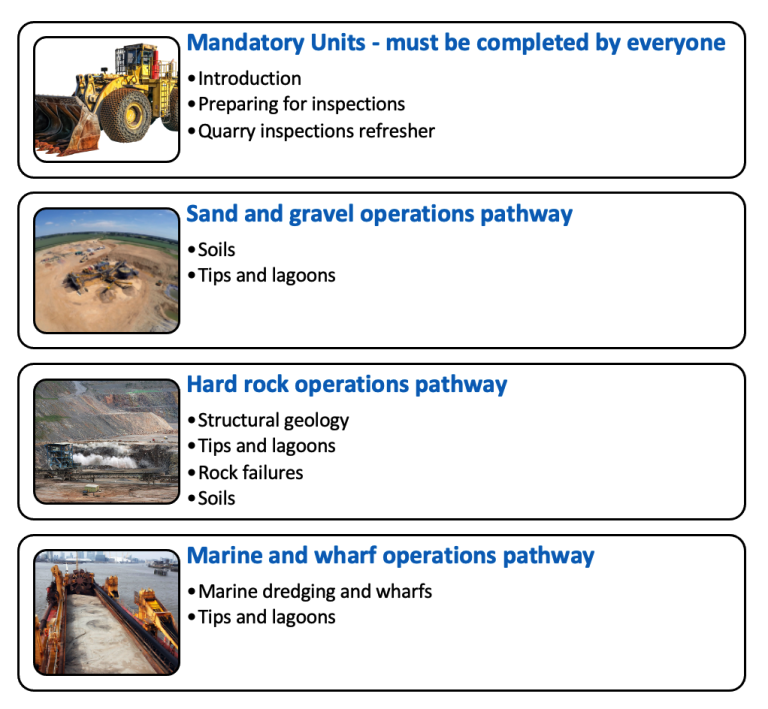Summary
Safety Coaching have partnered with the Institute of Quarrying to be deliver the new Level 3 Geotechnical knowledge qualification. The qualification is delivered in three separate core modules, over a period of approximately 3 months (there is a three-month deadline from registration to complete the qualification)
Which role is the qualification aimed at?
The qualification is intended for anyone with supervisory responsibility for excavation and tips on a day-to-day basis.
We recommend that anyone managing operations on a day-to-day basis should complete the level 4 qualification. The Institute of Quarrying recommends that attendees should complete the level 3 before completing the level 4.
There is also level 2 qualification aimed at personnel who are exposed to the hazards of excavations and tips as part of their role, for example an excavator operator.
Module 1 – Face to face delivery
The first module is a blend of classroom-based theory through an interactive workshop. This is followed by a site visit to discuss the content from the workshop using real life examples.
The content within the delivery covers both elements of hard rock operations and sand/ gravel. Taking this into account it is important that the course is delivered on operational site which has access for the course delegates to quarry faces, haul roads, stockpiles and tips. This session will last a full day.
Content to be covered:-
- Physical properties of mineral types quarried. Sand, sand and gravel, clay/ mudstone, hard rock
- Difference between mineral as a product (product type and quality) and properties in the ground (influence on extraction procedures)
- The significance and relevance of the Quarries Regulations, how the industry can satisfy health and safety requirements – inspections leading to appraisals. Company procedures, importance and to operational staff
- Characteristics of quarry features; excavation faces, overburden, haul roads, ramps, tips, stockpiles and lagoons
- Main failure types and hazards
- Regulation framework
- Inspection schemes – what to look for, undertaking and recording inspections, identification of hazards. Introduction to appraisals
- Outline of best practice – for existing features, control/ mitigation, protection/ regular inspection
- Design considerations – for new quarry or development (including new quarry elements e.g., new overburden tip); effective extraction, reduction of risk, improve safety
Module 2 – E-learning
Learners can log into the portal and cover their e-learning modules at their own pace. The ‘pathway’ they follow is set by the type of operation they are working in. Either hard rock, sand and gravel or marine/ wharf. There are mandatory units that everyone needs to complete.

Module 3 – Professional discussion
In order to pass the course every learner must complete a one-to-one professional discussion with an approved industry specialist in the safety of excavations and tips. The discussion may take place either face to face or via video call.
The industry expert will ask you a range of questions in relation to your knowledge and application of the safe supervision of excavations and tips, they will record your answers. It is important you provide a detailed response in relation to the question asked.
Your industry specialist will record your answers and make an assessment decision as to whether you have met the required standard for the answer given.
If you do not meet the required standard within the professional discussion, you will have deemed not to have passed the course and you will be required to re-sit the course.
*Please note any further learning will result in additional charges
If you pass the professional discussion your assessor will inform you and put you forward for certification for the qualification.
Each candidate portfolio is then assessed by an internal verifier and the certificate is awarded.
For example, your assessor may ask you ‘who do the excavations and tips rules apply to?’
Key Point of note
As this section of the course is pathway driven you will receive an endorsement in the section chosen. For example, someone completing the sand/ gravel pathway would not endorsed for hardrock or marine operations. Care should be taken when supervisors/ managers move operations. They will need to ‘top up’ their knowledge on a new pathway to have evidence of competence.